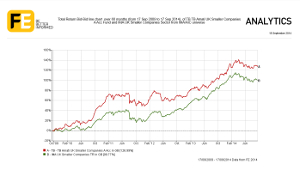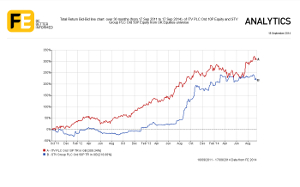Fund profile: Amati UK Smaller Companies
19th September 2014 10:23
Over 15 years old and boasting some solid performance, and its manager Paul Jourdan both deserve to be better known.
Amati UK Smaller Companies has an interesting history. Launched in 1998 as First State British Smaller Companies, the fund was originally part of the First State's now defunct UK equity offering, which it sold to Noble Investment Group in 2007.
A casualty of the credit crunch, Noble was sold just three years later leading to the birth of Amati Investments in 2010 founded by the fund's manager, Paul Jourdan and his Noble Investment colleague Douglas Lawson.
Manager of the fund since 2000, ex-professional violinist Jourdan has seen it through all of these changes while producing some solid returns.
Euro sceptic

This does, however, mask a couple of relatively disappointing years for the fund. In both 2012 and 2013 Amati UK Smaller Companies ranked close to the bottom of its sector with returns of 12% and 30% compared to sector averages of 23% and 37% respectively.
According to Jourdan, this is almost entirely down to the European crisis of 2011, which prompted him to position the fund ultra-defensively in the following years.
"In the eurozone crisis we took the view that if a really big macro risk comes along that we are worried about we'll take action. In performance terms it made us look very stupid, but in risk management terms I don't think it was.
"When there is a big risk we do worry about it; it might mean that we give up some years of performance because of it, but if you're going to manage risks you've got to be willing to do that," says Jourdan.
Recent data out of the eurozone has, however, supported Jourdan's view and the fund has regained ground. Over one year it has delivered 12% compared to 8% from the sector and 5% from the benchmark, while year to date it is one of only 11 out of 53 UK smaller companies funds to deliver more than 2% (and one of 17 to make a positive return at all).
On the outlook for the UK market, which has not performed phenomenally well this year itself, the manager says that he is "cautiously optimistic" as although there are plenty of good stories, there are also plenty of negative ones.
"If you draw a graph of GDP growth from 2009, the UK isn't looking that clever. Despite all the political rhetoric we're just catching up and we're miles behind Germany. So we're making no assumptions about economic tailwinds pushing things along, quite the opposite; that's why we want companies that are robust," he says.
Robust companies
To identify "robust" companies, particularly in the smaller companies' space, Jourdan says managers really need to "do their homework". For him, some of the most important things include; the quality of the business franchise, how well it's run, how predictable it is, the earnings quality, cash generation, management teams and how comfortable he is that it can realise its plans.
As an example he cites , his third largest holding at 3.3% of the portfolio. Like its English equivalent , Jourdan says that STV became "over geared" during the credit crunch and hence unattractive to investors.

With STV's share price having risen an astonishing 223% over the past three years, this proved to be a shrewd move.
Innovation is also important to Jourdan, one of the reasons he chose to invest in his second largest holding, . Almost completely unknown in the UK, foreign exchange payment facilitator Earthport recently benefited from the US government's Dodd Frank's Act, part of which requires banks to disclose all processes and charges involved in conducting foreign exchange payments.
Having spent a decade implementing the infrastructure to do this very thing, Jourdan claims that Earthport went from a loss-making to a viable company almost overnight and now has a plethora of major financial institutions lining up to work with it, including Bank of America.
"For the core of the portfolio we are looking for companies that are addressing very particular industries where something interesting is happening and they're driving it, and our investment case on Earthport was that they will be providing a crucial piece of the global banking infrastructure," he says.
Future plans
This year a number of concerns have been voiced about the short-term future of UK smaller companies in the face of three years of solid outperformance, with the IMA UK smaller companies sector currently one of the worst performing in the Investment Management Association (IMA) universe.
Jourdan, however, insists that there are still plenty of opportunities to be found in the space that don't require managers to take on more risk in order to invest - as is often the accusation made about small caps.
"There is a big spectrum in UK small caps within which there is a great pool of companies which are very sensible risks. You've also got incredible diversification; there are 1,100 companies we can look at in the UK so there is always going to be something that is really interesting.
"That is unlike in the FTSE 100 (UKX) where you have a lot of growth stories but also a lot of structural decline stories; so actually, which is riskier? These questions are not that well explored," says Jourdan.
With 54% of the fund invested in companies valued at below £250 million, however, Jourdan does admit that he would like to move up the market spectrum a little as and when the opportunity arises.
Jourdan would also like to grow the fund, which at £12.5 million is currently one of the smallest funds in the sector as, he says, investors have been following the herd and piling into only a few select names.
"We would like to be a lot bigger, we definitely have ambitions for that. We don't want it to become one of the giants of the sector that's for sure, but we'd love it to be £200 million and I think it should be; it's got the track record and the longevity to be there," he says.
Editor's Picks